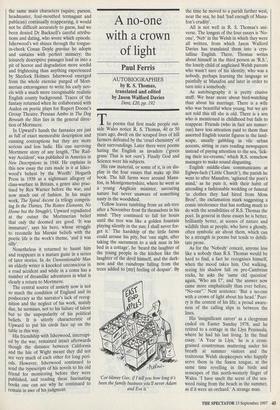The rotten borough
Anthony Curtis
Mortmere was a private literary fanta- sy invented by Edward Upward and Christopher Isherwood when they were Cambridge undergraduates. It went public in 1938 in Isherwood's Lions and Shadows: An Education in the 1920s in which he described their time as boys at Repton just after the first world war and at Corpus as rebellious undergraduates. Mortmere evolved as a reaction to what Upward called the university's `poshocracy' and the world of academic preferment whose greasy ladder they refused to climb. What emerged in Lions was a much edited version of the material. It was far too inde- cent to publish in full in those days; and anyway at the time of his conversion to Marxism Upward destroyed most of his contributions, putting childish Mortmerian things behind him (or so he thought at the time).
Because of the intense curiosity sur- rounding 'Christopher Isherwood', both the fictional and the real, Mortmere has refused to go away; sooner or later an exhumation of all that remained of this sin- ister domain was bound to come. It took place officially in 1994 when the British Library held an exhibition of the Mortmere and other manuscripts it has acquired by Isherwood and Upward. Mr Upward at the age of 91 attended the opening ceremony and I had a few words with him. I found him very easy to talk to, a quiet, courteous, scholarly man, the last person you would expect still to be a committed Marxist, although he relinquished membership of the Communist party in 1948. To coincide with the exhibition, this edition of The Mortmere Stories with an introduction by Katherine Bucknell (editor of Auden's juvenilia and Isherwood's diaries) was pub- lished by the Enitharmon Press which spe- cialises in authors whose work inspires minority cults.
There is always a temptation to read too much into juvenilia or apprentice work of this kind when it sees the light of day, to discover for example the origin of Wuthering Heights in the 'Gonda"' saga or of Narnia in the Boxen cycle written by C.S. Lewis at around the age of seven. But in the case of the Mortmere canon the wis- dom of hindsight is hard to resist. The evi- dence of imaginative exuberance and resource of invention in what Upward describes, in his essay Christopher Isher- wood: Notes in Remembrances of a Friend- ship (published last year in a limited edition of 200 copies), as 'a free-discipline school in which we could uninhibitedly exercise our powers as writers' is formidable. Here is an amusing range of caricatured characters spanning an archetypal pre-war rural England, all of them poised to come to a sticky end. The tales reveal, to be sure, a puerile, giggly fascination with excrement and bodily functions but they possess quite exceptional energy, verve and professional- ism as well. There could have been no doubt in the mind of any of their friends, like Auden who read the work, that the authors were going to become writers and not dons.
In spite of Mortmere being a shared fan- tasy with equal input from its two authors, the same main characters (squire, parson, headmaster, foul-mouthed termagant and publican) continually reappearing, it would not be difficult accurately to guess, had we been denied Dr Bucknell's careful attribu- tions and dating, who wrote which episode. Isherwood's wit shines through the tongue- in-cheek Conan Doyle gravitas he adopts and sustains with perfect mimicry; the leisurely descriptive passages lead us into a pit of horror and degradation more sordid and frightening than anything experienced by Sherlock Holmes. Isherwood emerged from the whole exercise purged of Mort- merian extravagance to write his early nov- els with a much more recognisable realistic English county background. Traces of the fantasy returned when he collaborated with Auden on poetic plays for Rupert Doone's Group Theatre. Pressan Ambo in The Dog Beneath the Skin lies in the general direc- tion of Mortmere.
In Upward's hands the fantasies are just as full of exact memorable description and cunning contraptions but they are more serious and less ludic. His one surviving Mortmere story of any length, 'The Rail- way Accident', was published in America in New Descriptions in 1948. He explains in this new essay the cuts made in it at Isher- wood's behest by the Woolfs' Hogarth Press in 1938 as a nightmare allegory of class-warfare in Britain, a genre also prac- tised by Rex Warner before the war, and now much out of fashion. In his major work, The Spiral Ascent (a trilogy compris- ing In the Thirties, The Rotten Elements, No Home but the Struggle), Upward repudiated at the outset the Mortmerian belief that only the doomed are good. 'It was immature', says his hero, whose struggle to reconcile his Marxist beliefs with the poetic life is the work's theme, 'and it was silly'. Nonetheless it returned to haunt him and reappears in a mature guise in a series of later stories. In An Unmentionable Man an elderly writer is knocked unconscious in a road accident and while in a coma has a number of dreamlike adventures in what is clearly a return to Mortmere. The central source of anxiety now is not so much the condition of England and its poshocracy as the narrator's lack of recog- nition and the neglect of his work, mainly due, he surmises, not to his failure of talent but to the unpopularity of his political beliefs. It is utterly characteristic of Upward to put his cards face up on the table in this way. His friendship with Isherwood, interrupt- ed by the war, remained intact afterwards though the distance between California and the Isle of Wight meant they did not see very much of each other for long peri- ods. However, Isherwood continued to send the typescripts of his novels to his old friend for monitoring before they were published, and reading these fascinating books one can see why he continued to remain in awe of his judgment.




































































 Previous page
Previous page